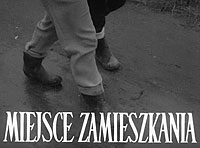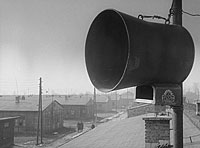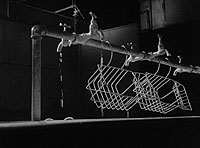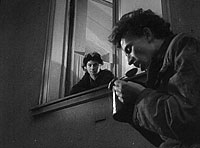 Miejsce zamieszkania
Miejsce zamieszkania
Poland, 1957, black and white, 16 mins
Of all the “black series” documentaries presented on PWA’s collection, Place of Residence is most explicitly indebted to the Socialist Realist tradition that dominated Polish cinema from the late 1940s to the mid 1950s. Taking its cue from wide-eyed celebrations such as Andrzej Munk’s Destination Nowa Huta! (Kierunek Nowa Huta, 1951), it takes a closer look at the actual lifestyle of the workers being eulogised as heroic exemplars of People’s Poland – and, to no-one’s surprise, uncovers what after three years of the “black series” is an all too familiar chasm between official rhetoric and observed reality.

We first see a group of men heading to what appears to be some kind of employment office – a nearby tannoy is broadcasting output statistics – but it’s actually a bar serving its customers through a small hatch. As the tannoy talks about “the great effort and dedication of our brave team who have stood at the construction site to create a city worthy of our epoch”, one purchaser laces his and his companions’ beer with what appears to be vodka. Something already seems awry. The tannoy goes on to boast about the workers’ new housing conditions, far superior to those in the villages from which they originally hailed, and equipped with the latest mod cons. So why are large numbers of them cooking soup outdoors using makeshift stoves comprising bricks, scraps of wood and a bucket? They don’t look like tramps, and indeed they’re not – they’re the workers who built the furnaces and steelworks of Nowa Huta, the industrial complex hailed as a model working and living environment.

The administrator of the housing estate of Pleszów gives us a carefully regulated guided tour, stressing the twin emphasis of culture and sanitation, showing off the impeccably maintained buildings, bedrooms and bathrooms. But then Augustyn Bloch’s music takes on a darker tone, pounding piano chords in the lower register matching an equivalent change in visual mood as we see a couple communicating, Romeo and Juliet-like, via her window. Actually, they’re married already, but they can’t live together, as they’re both required to live in segregated workers’ accommodation. Trysting in shared bedrooms is rendered impossible by fellow workers trying to sleep and – in a somewhat bathetic touch – a romantic stroll outdoors is ruined by rain. Later, a man frantically bangs on the door after hours – normally strictly verboten, but his wife is about to give birth.
A pan across a table crammed with cooking equipment reveals why many prefer the alfresco arrangement, especially when lengthy queues and resulting rows are thrown into the mix – the upshot of just one kitchen per five storeys, or forty families. Cultural facilities have been equally poorly thought out, allocated by timetable rather than individual need, so gangs of rowdy youths burst into a song recital and start a fight – an understandable way of relieving tension when they have to share tiny rooms and listen to snoring and dripping taps all night.

A great many classic Polish documentaries have highlighted the shortcomings of housing in 1950s Poland. But what separates this film from Brzozowa Street/Ulica Brzozowa (1947), Warsaw ’56/Warszawa 1956 and The Lublin Old Town/Lubelska starówka (both 1956) is that while the earlier films highlighted the dangers of living in ancient, crumbling, war-blasted accommodation, Place of Residence is about facilities constructed within the last few years, allegedly according to the highest modern standards. Ironically, those parts of the Pleszów complex that really are up to scratch tend to be ignored, because the workers feel intimidated by the cavernous lounge. Far better to go to the bar, drink more vodka-laced beer and ignore the tannoy: after all, nothing it says has any relationship to their lives as they actually live them. Meanwhile, the anonymous administrator relaxes in his office, with its dual phone lines and padded door (to keep out the sound of disgruntled residents), writing works of fiction masquerading as official reports.
- Director: Maksymilian Wrocławski
- Script: Z. Wróbiewski, Maksymilian Wrocławski
- Camera: Tadeusz Korecki
- Editor: Jadwiga Zajiček
- Sound: Halina Paszkowska
- Music: Augustyn Bloch
- Narrator: Tadeusz Łomnicki
- Production Manager: Zygmunt Rybarski
- Production Company: WFD
The film is included on PWA’s Polish School of the Documentary: The Black Series double-DVD set (Region 0 PAL). Aside from a few spots and scratches, the source print is generally in excellent condition, and the soundtrack perfectly acceptable, bar a modicum of faint hiss that’s absolutely characteristic of a late 1950s recording. The subtitles have quite a few typos and other idiosyncrasies, but they don’t significantly affect appreciation.